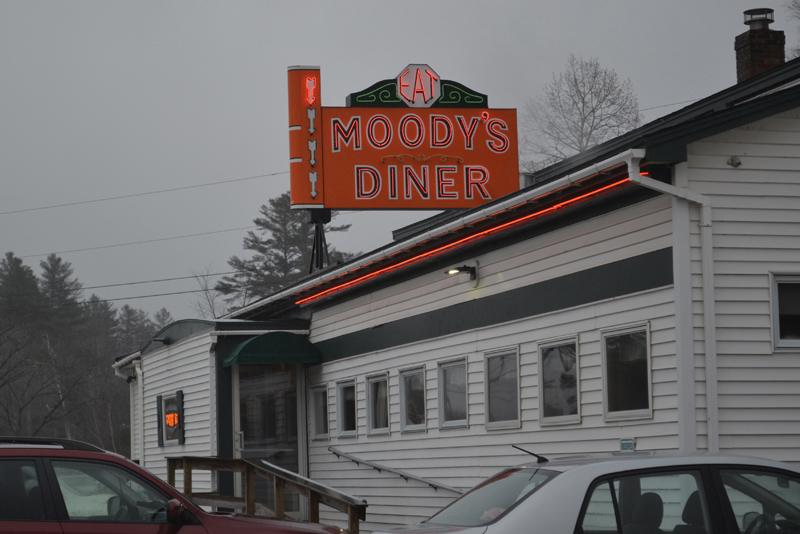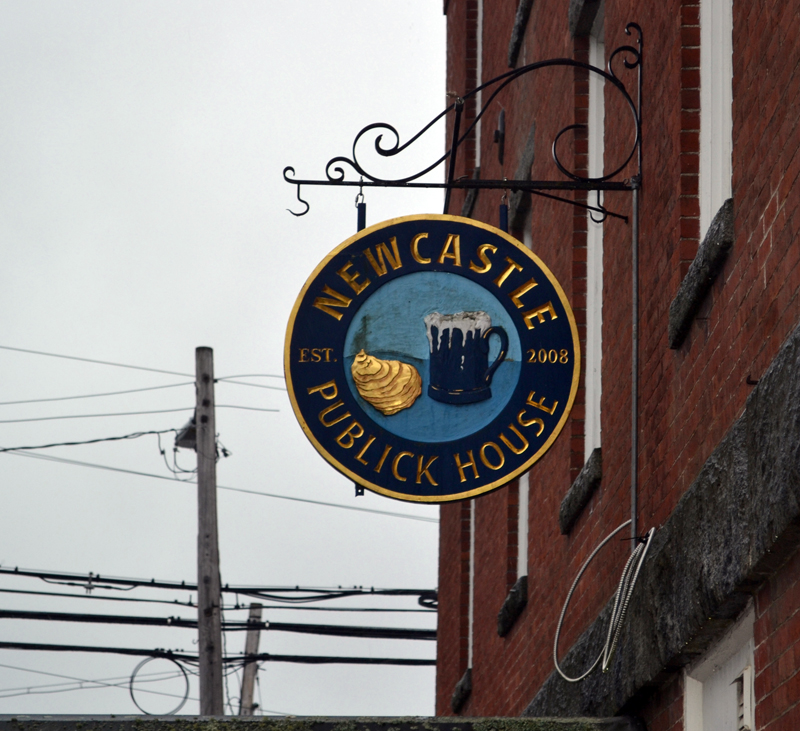
Moody’s Diner on Tuesday, April 4, the day before the diner closed so staff could attend a public hearing in Augusta to support the reinstatement of the tip credit. (Abigail Adams photo)
Moody’s Diner, the iconic restaurant on Route 1 in Waldoboro, will close for the day Wednesday, April 5, as about 25 staff members travel to Augusta to support legislative efforts to restore the tip credit.
The tip credit was eliminated as part of the increase in the minimum wage enacted by referendum in November.
Opponents say the elimination of the tip credit will adversely affect restaurants and servers – driving up restaurant payrolls while driving down servers’ tips. Supporters point to other states where they say eliminating the tip credit has had positive outcomes.
Moody’s Diner has already had to reduce staff hours and raise the prices of some menu items to contend with the pressure the new minimum wage law has placed on the restaurant’s payroll, said General Manager Dan Beck.
Beck and several other members of the Maine Restaurant Association will testify in support of L.D. 673 and L.D. 702, separate bills that seek to restore the tip credit.
While he is “on the fence” about the tip credit, Alex Nevens, owner of the Newcastle Publick House and Coveside Restaurant, has not had to raise prices or reduce staff hours as a result of the new law, he said.
Nevens will also be in Augusta on Wednesday, April 5. He will not testify for or against L.D. 673 or L.D. 702, but will share his perspective and throw his support behind L.D. 1117, which would establish a commission to study the impact of phasing out the tip credit, he said.
Beck will testify in opposition to L.D. 1117, which he said was introduced as a “distraction.” The commission could take years before proposing recommendations on the tip credit, Beck said.
“Every year this is on the table is devastating,” Beck said. “We need to fix it now, so we have a much more secure future.”
With the tip credit in place, servers earned half the minimum wage for other workers. The employers only had to kick in the rest if a server’s tips didn’t make up the difference.
In November, voters approved a citizen’s initiative referendum question to raise the minimum wage to $12 by 2020. Included in the “Act to Raise the Minimum Wage” was the phasing out of the tip credit over an eight-year period.
Wages for servers increased to $5 an hour Jan. 1 and will increase by $1 every year until 2024, when servers will also make an hourly wage of $12.
L.D. 673, “An Act to Restore the Tip Credit to Maine’s Minimum Wage Law,” and L.D. 702, “An Act to Restore the Tip Credit to Maine Employees,” are similar bills.
The bills vary on the wage servers would receive. L.D. 673 leaves the mandated increase to $5 in place. L.D. 702 would revert to the former system of 50 percent of the minimum wage.
The liberal Maine People’s Alliance helped introduce the referendum question to raise the minimum wage. The new minimum wage was approved 420,892-337,486 in November. Lincoln County voted in favor of the law 12,297-9,567.
The elimination of the tip credit was an aspect of the minimum wage law that was “slyly put in,” Beck said. It is impacting the ability of Moody’s Diner to provide for the restaurant’s full staff, which ranges from 60-80 employees based on the time of year.
The mandated raise for servers has had a negative impact on staff “in the back of the house,” Beck said.

The Newcastle Publick House on Tuesday, April 4, the day before owner Alex Nevens planned to testify in Augusta to support the creation of a commission to study the elimination of the tip credit. (Abigail Adams photo)
Many of the restaurant’s cooks and kitchen staff, outside of students who work at the restaurant seasonally, have not been affected by the increase in the minimum wage, because they already earn more than $9 per hour, Beck said.
“The most devastating blow (of the new law) is the elimination of the tip credit,” Beck said. “It takes the highest-paid worker in the restaurant and gives them a mandated raise. The only way a small-business owner can absorb that is to raise prices, reduce benefits, reduce hours, and reduce charitable contributions.”
Prior to the new law, servers at Moody’s Diner received $3.75 an hour plus tips, Beck said. The 20-30 part-time and full-time servers at the restaurant were already earning some of the highest incomes among the staff prior to the change in the law, he said.
Many servers have been with the restaurant for decades, Beck said. “They’re not here because they’re barely getting by; they’re making a good income,” he said.
Nevens is a member of the Maine People’s Alliance and “a 100 percent advocate for an overall minimum wage increase,” he said. However, Nevens said he is undecided about the benefits of phasing out the tip credit.
While he is aware of examples where it has worked in other states, the servers at the Publick House and Coveside make a good income, Nevens said. The raise for servers does create inequity in the pay scale, increasing disparity between servers’ incomes and the wages of cooks and kitchen staff, he said.
In terms of hiring staff, Nevens said he would be more inclined to put additional servers on the schedule if the tip credit remained in place.
However, the “sky is falling attitude” coming from the Maine Restaurant Association is “disingenuous,” Nevens said. He supports L.D. 1117, which would establish a commission to study the impact of the tip credit phase-out over a two-year period and report its findings to the Legislature no later than March 19, 2019.
“We need to look at it and examine it,” Nevens said. The impact on servers will differ from restaurant to restaurant, and may prove to benefit servers at restaurants with lower average ticket prices, he said.
According to Beck, the phase-out of the tip credit is estimated to add a cumulative $300,000 to the payroll at Moody’s Diner over the next eight years.
The restaurant offers paid vacation and health insurance to full-time staff, but might need to look at reducing benefits and eliminating its charitable contributions, Beck said.
“I want to be a generous employer and be good to the community. I want to be able to provide these things, but as business owners, our hands are tied,” he said.
“This really is a deathblow to mom-and-pop full-service restaurants,” Beck said.
With only one quarter complete since the new minimum wage law took effect, information about its impact is only starting to become available, Nevens said. The claims that restaurants will be forced out of business are “trumped up,” he said.
The focus for Nevens is ensuring that all of his staff earn a livable wage, he said. “I don’t want to run a workplace where my staff can’t afford to live,” he said. “That’s my take on it.”
Beck said he is testifying in support of both L.D. 673 and L.D. 702 to benefit employees. “This isn’t about putting more money in business owners’ pockets, this is about the employees,” he said. The diner “is celebrating its 90th year,” Beck said. “We want to make it to 100.”
The Labor, Commerce, Research, and Economic Development Committee is considering the legislation. A public hearing is scheduled for Wednesday, April 5 at 10 a.m. in the Cross Building.






